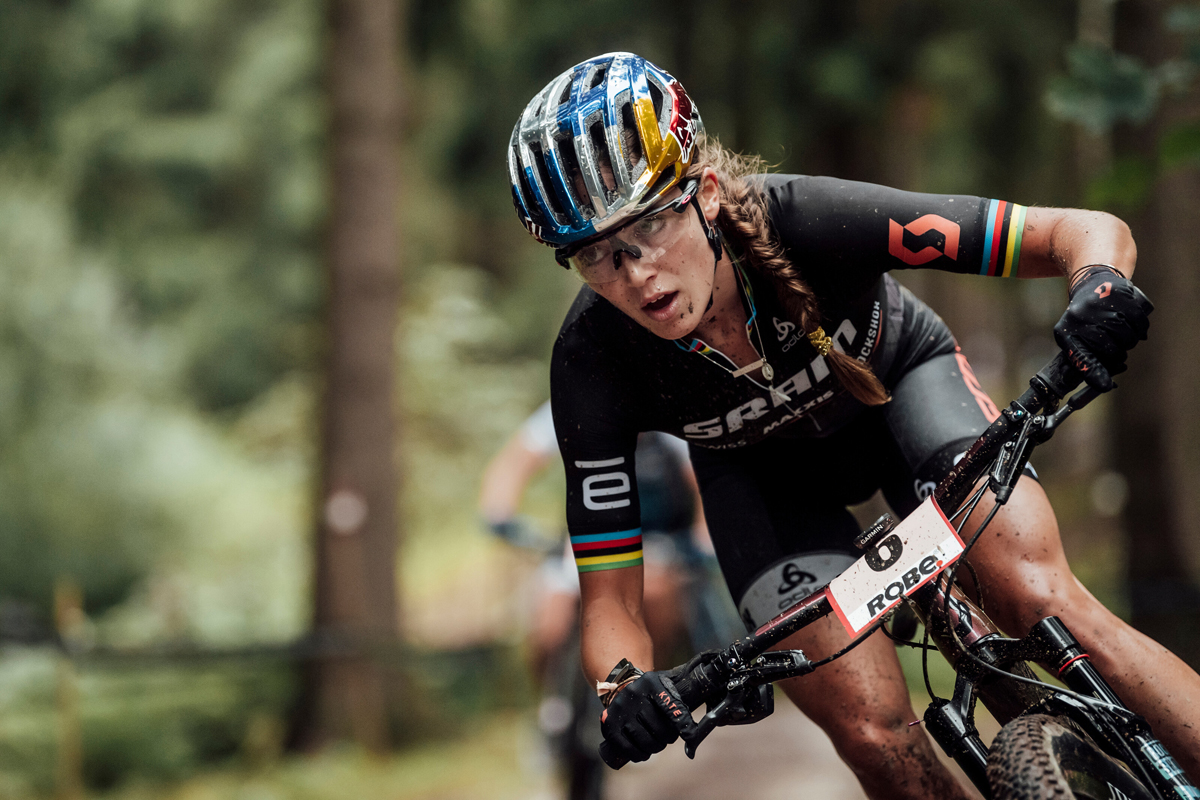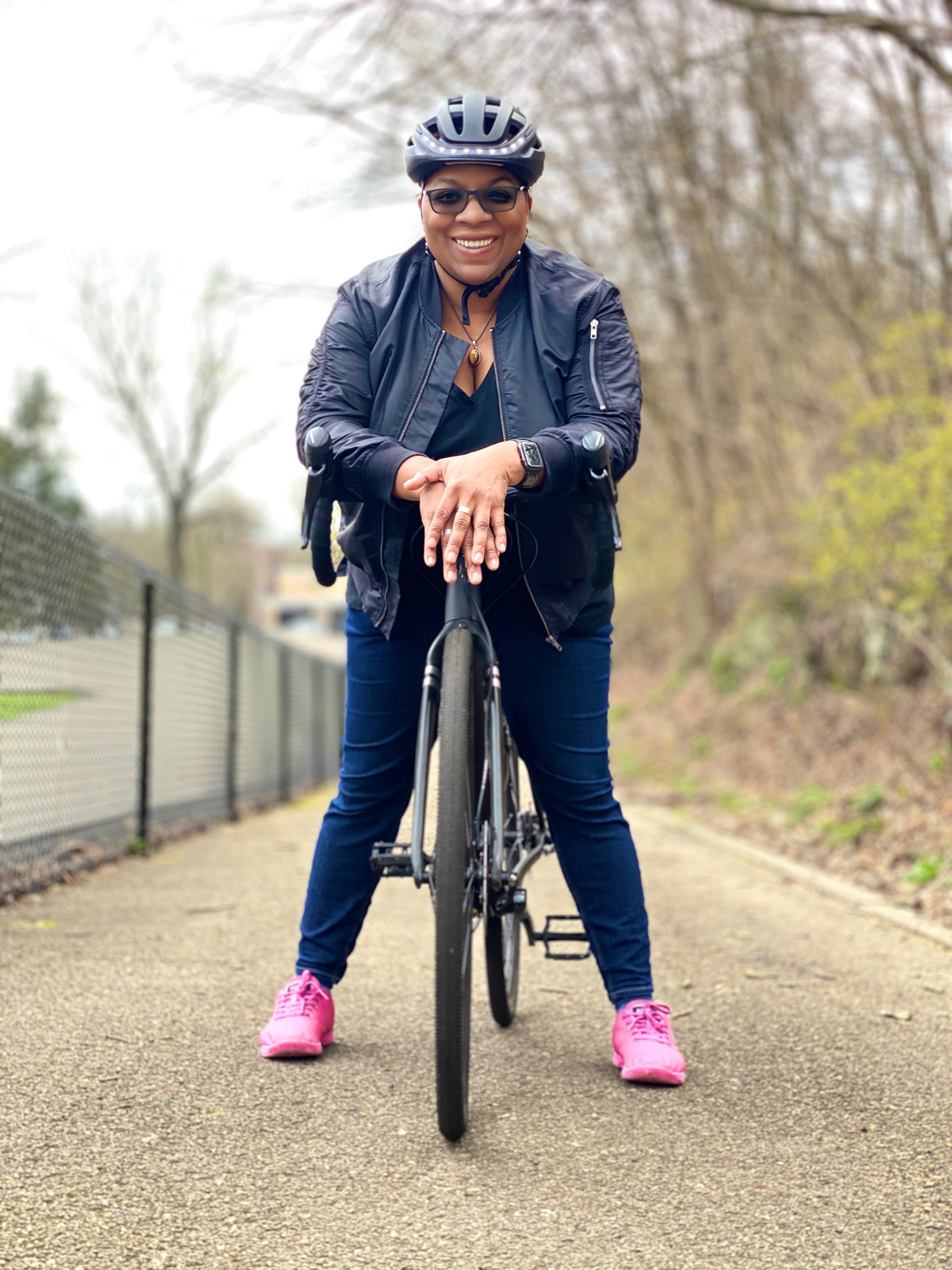American mountain biker Kate Courtney reveals her training regime and 2021 goals
With a cross-country World Championship and overall World Cup title already in the bag, Kate Courtney is rightly viewed as one of the world’s best mountain bike riders.
But the 25-year-old is only just getting started and has created the ultimate home backyard training set-up to help her add to her already significant haul of trophies.
Known as her fitness fortress, the area boasts a well-stocked gym complete, Zwift set-up, ice bath and even her very own outdoor sauna.

Here is what the American had to say about her training regime, the importance of recovery and what she hopes to achieve during the 2021 race season:
What’s your first memory of cycling?
My first vivid cycling memory is riding on the back of the tandem with my dad. We went out in the rain, there was no-one else on the mountain and the weather continued to decline. We ended up seeking shelter and we found five crumpled up dollars in my dad’s saddle bag, so we got blueberry pancakes. Of course to me that was the most epic day and for the longest time that’s what cycling was; a way to spend time with my dad, to get out and if I’m lucky, get some blueberry pancakes.
I think the connections that you form while cycling are really unique, partly because it’s a sport where you can be side by side, or on the tandem I was behind and you can talk. It’s really a great way to connect with people, whether it was my parents, my brother growing up, or now some of my closest friends.
What does your typical training regime look like?
I would say my lowest weeks are 15 to 17 hours on the bike and my biggest weeks are 25 to 30 hours, but those are rarer. I consider strength training part of my fitness training and I spend anywhere from two to six hours a week in the gym. I trained a lot more volume last year, as I didn’t travel much and did 20 to 25 hour a week of training, every week.
I approach it on a two-year cycle and last year was what we referred to as a development year, which also changes this year quite a bit and that for me is quite exciting. I think it’s producing different results and I’m definitely coming into this second year approaching Tokyo more rested physically and mentally.
The focus this spring is on the high-intensity, knife-sharpening race prep, which is my typical race build up; you do base, you have to do moderate training, then I start in spring to do intensity and for me that’s in the form of training camps.
I just got back from Malibu where we did ‘Mali-Boot Camp’ with three of my old team-mates. We design these camps to really push me and help me progress towards racing, then training gets a bit more intensity-and recovery-focused once we hit the race season.
I do yoga, I do mobility work, I work with a PT and do a lot of recovery activities outside of training like foam rolling, ice baths and saunas. And number one – very good sleep!
How important is recovery in the training process?
I think that’s the frontier of sports performance right now. If you are always going at 75 to 90 percent of max, you never recover, but you also never hit that 100 percent. It’s about using your motivation and your skills at planning and resting to maximize those important sessions and avoiding those medium-effort, medium-motivation which burn you out in the long run.
Do you find it hard to switch off on your rest days?
I’m working on it! I’m proud of this year; I’ve taken more complete rest days and that’s something that I used to not do. I use Whoop to track my recovery and every day that I take as a complete rest, the next day I’m in the green, so it definitely works.
It’s a challenge for me managing how much I do on these rest days, because I have to do something during and I think my dog has been my secret weapon! I’ll take him for a walk, I’ll take him to the beach; I’ve done something, but it’s quite relaxing.
What about the mental side of fitness and health – do you train that?
Definitely! I work with a sports psychologist and I have for the past five years. I personally think that the mental game is a huge part of success, but it’s also a huge part of just being a healthy, happy person in the long run. I think that dealing with situations and emotions requires certain skills and perspectives that need to be developed and for me that’s done through sports psychology, plus reading, journaling and all of those kinds of things where I give myself space and time.
Do you get nervous before races and if so, how do you manage that?
I do, definitely; I think everyone does and I think nerves are a sign you really care about something. For me, I think preparation is the antidote to those challenging situations, because at the end of the day you can only control what you can control. If you manage those things, hopefully the outcome takes care of itself and if it doesn’t, hopefully you’ll have more opportunities in the future.
Do you use online training as part of your preparation?
I’m doing my first Zwift race! I’m trying to embrace the opportunities that we do have to stay in shape, not just ‘in shape’ in the normal way – I can train – but I think there are some things you definitely get from competition that you can’t replicate and that’s what I learned last year. You can race yourself around as much as you want, but for your central nervous system actual racing is just a different stimulus. We’ve been looking for more ways to incorporate that into my training, whether it’s Strava segments, getting fast people to ride with or compete with, or even Zwift racing, which I said I would never do! I’m doing some small warm-up ones, some very random races, because I think that there’s some finesse to it, but I will report back!
What about the research being done into female athletes training around the menstrual cycle? Is that something you look at within your training?
I have and I’ve worked with Red Bull on that. I think it’s very important and very interesting that people are finally looking at the differences between men and women. Hopefully there’ll continue to be more studies, not just around menstruation but also nutrition in the future and training. I think a lot of these baselines that we take for granted are based on research done primarily on men and so that kind of cutting-edge research is going to be important moving forward and it’s exciting that they’re finally doing more.
What drew you to study human biology – did it come from your interest in sport or is it something you’ve always had a passion for?
I think it was a little bit unrelated to cycling. I studied human biology, which at Stanford University is a very interdisciplinary major and we have a lot of freedom to tailor it to your interests. I was interested in global health and technology innovation, so it was a very Silicon Valley thing to be looking into.
I really enjoyed learning about health, less on a biological individual basis and more on an aggregate basis. Of course we had to take bio and get all of those fundamentals, but I was more interested in public health and global health level of analysis and that’s certainly something that’s been very interesting this year!
Did your studies include wearable tech?
It was health tech and wearables, mobile apps, those kinds of things. And being where Stanford is, in Silicon Valley, meant it was a really unique experience – we got a lot of exposure to local start-ups and people coming in and telling us about things that might be on the horizon, which was really exciting. I hope to head back to some of that someday, but I enjoy focusing on bikes right now.
What does 2021 hold for you and what does it feel like to be competing in Tokyo?
There is a lot of excitement and emotion around it being the Tokyo Games; around the global connectivity and the media presence at this particular event. Last year I was much more wrapped up in it; I had qualified for my first team, I was on track to have a good performance there and had two very good years leading into it, where I took home the big titles that I wanted to take home, so I’m thinking ‘This is the last one! We’re good to go!’
But this year I think that things are quite different and having that year to do everything but the race – I got to do the emotional build-up and the media and all those other things – has actually been really helpful for me. You hear people say that the first time you go, you almost need a practice one because it’s so overwhelming and I think that after this year my ability to self-regulate and deal with challenging situations and emotions is heightened and I’ll be able to be much more calm and relaxed.
Also, it’s going to be much like other races. We don’t have a completely different field for it, it’s just smaller than a World Cup. It is a bit different from other sports, where they don’t compete against each other, then all of a sudden, they do.
Where does your confidence come from?
I heard a definition of it recently that was ‘confidence is the belief that you can uphold promises that you make to yourself’. You can develop confidence from different parts of your life, but for me it’s about believing that I can do things that I set out to do on the bike.
It’s a strategic combination of working on mental skills and managing the external environment to give me an opportunity to build confidence. It’s not always going to be linear and perfect, but if you’re progressing and getting better, you’re going to feel great!
Interview courtesy Red Bull Media







